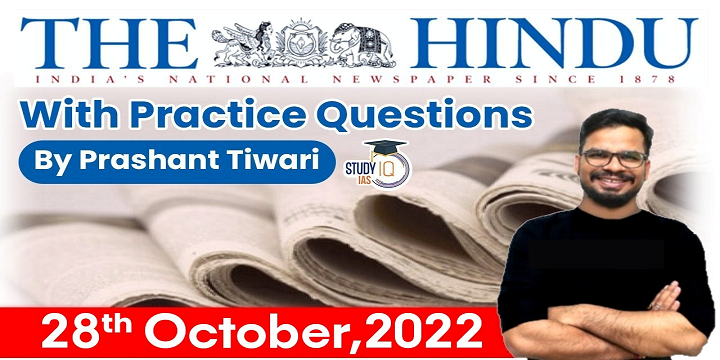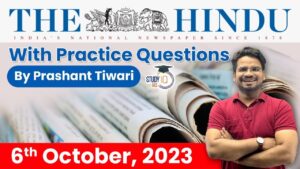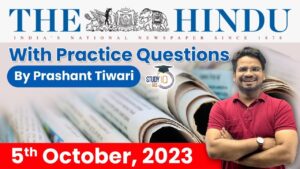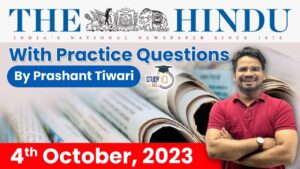The Hindu Newspaper Analysis for UPSC

The Hindu Newspaper Analysis 27 October 2022
- Union Home Minister Amit Shah said on Thursday that States should have a uniform law and order policy as certain crimes such as cross-border terrorism and cybercrimes transcend regional and international boundaries.
- Shah said that by 2024, to counter terror activities, each State would have a National Investigation Agency (NIA) office as the agency had been given “extra territorial jurisdiction” and additional powers to confiscate property in terror-related cases.
- He called for centralisation of data on terror and other crimes and said that following the principle of “one data, one entry,” the NIA had been entrusted with the task of maintaining a national terror database, the Enforcement Directorate a dataset on financial crimes and the Narcotics Control Bureau (NCB) on narco crimes.




- India has a long tradition of coinage with images of gods and goddesses. According to historians, the Kushans, who hailed from the Central Asian region and ruled till 3rd century AD, were the first to use the image of Goddess Lakshmi on their coins, along with Ardochsho, the Iranic Goddess of wealth.
- “The Kushans also depicted Oesho [Shiva], moon deity Miro and Buddha in their coinage,”
- the Vijayanagara kings used coinage with Hindu idols. Harihara –II (1377-1404) introduced coins that had Brahma-Saraswati, Vishnu-Lakshmi and Shiva-Parvati.
- About the coins with Goddess Lakshmi issued by Mohammed bin Sam, known to us as Mohammed Ghori after defeating Prithviraj Chauhan in the battle of Terrain in 1192 AD.

- Over the past three years, over 50% of existing central government-sponsored schemes have been discontinued, subsumed, revamped or rationalised into other schemes.
- For example, for the Union Ministry of Women and Child Development, there are just three schemes now out of 19 schemes, i.e., Mission Shakti, Mission Vatsalya, Saksham Anganwadi and Poshan 2.0.
- For schemes that exist, there are challenges such as funding cuts, disbursement and utilisation of funds.
- The Nirbhaya fund (2013) with its focus on funding projects to improve the public safety of women in public spaces and encourage their participation in economic and social activities is an interesting case; ₹1,000 crore was allocated to the fund annually (2013-16), and remained largely unspent.

- Kerala Governor Arif Mohammed Khan has declared that he is withdrawing his pleasure as far as Finance Minister K.N. Balagopal is concerned.
- He expects constitutionally appropriate action by Chief Minister Pinarayi Vijayan. In other words, Mr. Khan wants Mr. Balagopal dismissed for remarks that he sees as seditious, undermining national unity and stoking regionalism.
- Needless to say, the polite phrase in the Constitution that applies the doctrine of pleasure to a Minister’s tenure is nothing more than a reference to the will of the Chief Minister on the continuance or dismissal of a member of his ministerial Council.

- Ensuring sustainable development requires more than good intentions and verbal commitments. And yet, commitment is that crucial first step.
- Tamil Nadu has struck out clearly for a future that would be climate conscious, greener, with a series of announcements this year — in the form of government orders and via the Budget.
- Apart from getting the Ramsar Site declaration for a record number of ecological zones as a well-planned and implemented initiative, it has also declared its intention to create green parks in 100 villages, that would cater to local requirements too.

- Kerala Governor Arif Mohammed Khan recently criticised the State government for relying heavily on liquor and lottery to generate revenue.
- the role of the state is to provide public goods. The consumption of sin goods is instead linked with ‘public bad’. The negative effects of these sin goods disproportionately impact the weaker sections of society.
- The state can play a positive role in regulating the sale and consumption of sin goods. An important instrument is taxes.
- The fight against alcohol abuse, gambling, and so on must be long-term and multi-pronged. Taxing these goods alone will not help us win this fight. There have to be public education programmes to wean people away from, and thereby reduce the demand for, sin goods.

- India and Pakistan need to avoid unilateral moves that could complicate the situation, says Chinese Foreign Ministry spokesperson Mao Ning
- China on Thursday called on India and Pakistan to settle the Kashmir issue “through dialogue and consultation” and “avoid unilateral moves” that could “complicate” the situation.
- Beijing was asked to comment on its stand on the issue on Thursday by official media from Pakistan, which has recently launched an international campaign to mark the date, claiming India invaded Kashmir on October 27, 1949, although it was Pakistan that had, five days prior, sent in both troops and irregulars, sparking the dispute.

- Union Minister for Women and Child Development Smriti Irani and the National Commission for Women on Thursday hailed the “historic” decision of the Board of Control for Cricket in India (BCCI) on equal match fees for women players as their male counterparts, saying it was a significant achievement towards gender equality.

- On October 14, Turkey’s parliament adopted the much-critiqued ‘disinformation law’ that accords jail terms of up to three years to social media users and journalists for spreading ‘disinformation’.
- Turkey already has an unimpressive record pertaining to press freedom. It ranks 149 out of 180 in the Press Freedom Index (2022).
Q) With reference to the Asian Infrastructure Investment Bank (AIIB), consider the following statements:
- India is a founding member and the second largest shareholder in AIIB.
- It is headquartered in Beijing, China.
Which of the above statements is/are correct?
- 1 only
- 2 only
- Both 1 and 2
- Neither 1 nor 2
एशियन इन्फ्रास्ट्रक्चर इन्वेस्टमेंट बैंक (AIIB) के संदर्भ में, निम्नलिखित कथनों पर विचार करें:
- भारत एक संस्थापक सदस्य और एआईआईबी में दूसरा सबसे बड़ा शेयरधारक है।
- इसका मुख्यालय बीजिंग, चीन में है।
उपरोक्त में से कौन सा/से कथन सही है/हैं?
- केवल 1
- केवल 2
- दोनों 1 और 2
- न तो 1 और न ही 2
Explanation :
Union Minister of Finance & Corporate Affairs Smt. Nirmala Sitharaman attended the 7th Annual Meeting of the Board of Governors of AIIB via video conference.
- The theme of this year’s Annual Meeting was “Sustainable Infrastructure Toward a Connected World”.
- What is AIIB? AIIB is a multilateral development bank that aims to improve economic and social outcomes in Asia.
- Headquarters: Beijing, China.
- Board of Governors: All powers of the Bank are vested in our Board of Governors, which is the highest decision-making body under our Articles of Agreement.
- Membership: AIIB has 105 members. China is the AIIB’s largest shareholder with a 26.5% voting share. India is the second-largest, with 7.5%, followed by Russia, which has a 5.97% voting share.
- India is a Founding Member of AIIB. India also has the largest project portfolio within AIIB.
Q) With reference to National Means cum Merit Scholarship Scheme (NMMSS), consider the following statements:
- The students must have a minimum of 80 % marks or equivalent grade in Class VII to be eligible for the scheme.
- It is a 100% centrally sponsored scheme.
Which of the above statements is/are correct?
- 1 only
- 2 only
- Both 1 and 2
- Neither 1 nor 2
राष्ट्रीय साधन सह मेरिट छात्रवृत्ति योजना (एनएमएमएसएस) के संदर्भ में, निम्नलिखित कथनों पर विचार करें:
- योजना के लिए पात्र होने के लिए छात्रों के पास कक्षा VII में न्यूनतम 80% अंक या समकक्ष ग्रेड होना चाहिए।
- यह 100% केंद्र प्रायोजित योजना है।
उपरोक्त में से कौन सा/से कथन सही है/हैं?
- केवल 1
- केवल 2
- दोनों 1 और 2
- न तो 1 और न ही 2
About:
- What it is? Under the Scheme, scholarships are awarded to meritorious students of economically weaker sections to arrest their drop out at class VIII and encourage them to continue their education at secondary stage.
- This is a 100% centrally sponsored scheme.
- NMMSS is boarded on the National Scholarship Portal (NSP) – a one stop platform for scholarship schemes given to students.
- Features:
- The scholarships are disbursed directly into the bank accounts of selected students by electronic transfer through Public Financial Management System (PFMS) following DBT mode.
- One lakh fresh scholarships are awarded to selected students from class IX every year and their continuation / renewal in classes X to XII for students studying in State Government, Government-aided and local body schools. The amount of scholarship is Rs. 12000/- per annum
- Eligibility
- Students whose parental income from all sources is not more than Rs. 3,50,000/- per annum.
- The students must have minimum of 55% marks or equivalent grade in Class VII examination for appearing in the selection test for award of scholarship (relaxable by 5% for SC/ST students).
Q) Bangkok Declaration is related to which of the following organization?
- World Trade Organization
- International Labour Organization
- BRICS
- The Association of Southeast Asian Nations (ASEAN)
बैंकाक घोषणा निम्नलिखित में से किस संगठन से संबंधित है?
- विश्व व्यापार संगठन
- अंतर्राष्ट्रीय श्रम संगठन
- ब्रिक्स
- दक्षिण पूर्व एशियाई राष्ट्र संघ (आसियान)
The Association of Southeast Asian Nations (ASEAN)
- It was established on 8 August 1967 in Bangkok, Thailand, with the signing of the ASEAN Declaration (Bangkok Declaration) by the Founding Fathers of ASEAN: Indonesia, Malaysia, Philippines, Singapore and Thailand.
- Brunei Darussalam joined ASEAN in 1984, followed by Viet Nam in 1995, Lao PDR and Myanmar in 1997, and Cambodia in 1999, making up what is today the ten Member States of ASEAN.
- India’s relationship with ASEAN has emerged as a key cornerstone of our foreign policy. The relationship has evolved from the ‘Look East Policy’ enunciated in early 1990s which led India to become a Sectoral Partner of ASEAN in 1992, a Dialogue Partner in 1996 and a Summit-level Partner in 2002.
Q) Consider the following statements:
- RBI has the sole authority to decide and approve the design, form, and material of bank notes in India.
- The central government has the power to design and mint the coins in India.
Which of the above statements is/are correct?
- 1 only
- 2 only
- Both 1 and 2
- Neither 1 nor 2
निम्नलिखित कथनों पर विचार करें:
- भारतीय रिजर्व बैंक के पास भारत में बैंक नोटों के डिजाइन, रूप और सामग्री को तय करने और अनुमोदित करने का एकमात्र अधिकार है।
- केंद्र सरकार के पास भारत में सिक्कों को डिजाइन और ढालने की शक्ति है।
उपरोक्त में से कौन सा/से कथन सही है/हैं?
- केवल 1
- केवल 2
- दोनों 1 और 2
- न तो 1 और न ही 2
Role of RBI in issuing notes
- Section 22 of The Reserve Bank of India Act, 1934, gives RBI the “sole right” to issue banknotes in India.
- Section 25 states that “the design, form, and material of bank notes shall be such as may be approved by the Central Government after consideration of the recommendations made by the [RBI’s] Central Board”.
- The RBI’s Department of Currency Management has the responsibility of administering the core function of currency management. If the design of a currency note has to change, the Department works on the design and submits it to RBI, which recommends it to the central government. The government gives the final approval.
Minting of Coins
- The Coinage Act, 2011 gives the central government the power to design and mint coins in various denominations. In the case of coins, the role of the RBI is limited to the distribution of coins that are supplied by the central government.
- The government decides on the quantity of coins to be minted on the basis of indents received from the RBI on a yearly basis. Coins are minted in four mints owned by the Government of India in Mumbai, Hyderabad, Kolkata and Noida.
Q) With reference to The Navigation with Indian Constellation (NaVIC), consider the following statements:
- It has three satellites in the geostationary orbit and four in the geosynchronous orbit.
- It provides real-time positioning services in India and an area extending up to 1,500 km from the country’s borders.
Which of the above statements is/are correct?
- 1 only
- 2 only
- Both 1 and 2
- Neither 1 nor 2
भारतीय नक्षत्र के साथ नेविगेशन (NaVIC) के संदर्भ में, निम्नलिखित कथनों पर विचार करें:
- इसके तीन उपग्रह भूस्थिर कक्षा में और चार भू-समकालिक कक्षा में हैं।
- यह भारत में रीयल-टाइम पोजिशनिंग सेवाएं और देश की सीमाओं से 1,500 किमी तक का क्षेत्र प्रदान करता है।
उपरोक्त में से कौन सा/से कथन सही है/हैं?
- केवल 1
- केवल 2
- दोनों 1 और 2
- न तो 1 और न ही 2
Navigation with Indian Constellation (NavIC) Technology
- An autonomous regional satellite navigation system,also known as Indian Regional Navigation Satellite System (IRNSS), is developed by ISRO.
- It has been designed to provide accurate position information service to users in India as well as the region extending up to 1500 km from its boundary.
- It will provide two types of services:
- Standard Positioning Service (SPS): provided to all the users.
- Restricted Service (RS) : It is an encrypted service provided only to the authorised users.
- The IRNSS System is expected to provide a position accuracy of better than 20 m in the primary service area.
- Presently, it consists of 7 active satellites located at a distance of approximately 36,000 Km.
- 3 satellites are in Geostationary Orbit (GEO).
- 4 satellites are in inclined Geosynchronous Orbit (GSO).
The Hindu Newspaper Analysis 29 October 2022


 The Hindu Newspaper Analysis 6 October 2...
The Hindu Newspaper Analysis 6 October 2...
 The Hindu Newspaper Analysis 5 October 2...
The Hindu Newspaper Analysis 5 October 2...
 The Hindu Newspaper Analysis 4 October 2...
The Hindu Newspaper Analysis 4 October 2...





















